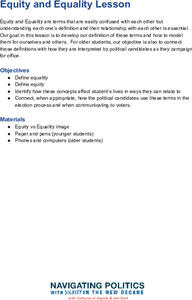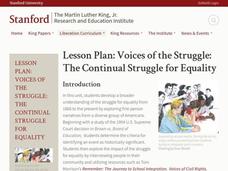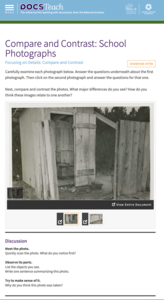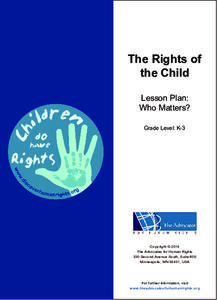Just Health Action
How are Equality and Equity Different?
Equality does not equal equity. That's the take-away from a lesson plan that asks young people to consider what could be done to make a variety of situations more just, more equitable. After examining images that illustrate the...
National Woman's History Museum
The Equal Rights Amendment
The debate over the Equal Rights Amendment continues. To better understand the controversy, class members research the history of attempts to get the amendment ratified. In addition, pairs engage in a structured academic conversation...
Illustrative Mathematics
Equality Number Sentences
Understanding the concept of equality is fundamental to the success of young mathematicians. To explore this basic idea, children compare the dots arranged in pairs of rectangles in order to determine whether or not they contain an equal...
Cultures of Dignity
Equity and Equality Lesson
Equality does not equal equity and this lesson explains why. Class members compare two images--one labeled "Equality" and the other "Equity." Using the provided discussion questions, they then develop definitions that distinguish between...
Equality and Human Rights Commission
Equality
Despite passing the Equality Act in 2010 covering many groups, gender inequality in Great Britain remains. Scholars investigate the concept of equality with a presentation, discussion, and hands-on timeline activities. The seventh lesson...
C-SPAN
14th Amendment Equal Protection Clause
Two Supreme Court cases, Plessy v. Ferguson and Brown v. Board of Education take center stage in a lesson about the Equal Protection Clause of the 14th Amendment. Class members research both cases to compare and contrast the rulings.
EngageNY
Analyzing the Author’s Perspective: “Equal Rights for Women” by Shirley Chisholm
It's all about perspective. Scholars talk about the meaning of perspective and look closely at the point of view of Equal Rights for Women. They discuss how Chisholm addresses the views of others and complete a close reading guide to...
Teaching Tolerance
Dismantling Racial Caste
It's time to end racism. The final installment of the series encourages scholars to consider what is needed to ended the racial caste system in the U.S. Young historians complete group discussion, written prompt, and a hands-on-activity...
Idaho Coalition
The Hunger Games: Gender Empowerment
The odds are in your favor that your pupils will love this lesson that uses The Hunger Games to launch a study of gender empowerment, as well as the influence of social constructs of gender. Groups discuss how Katniss Everdeen and Peeta...
Education Closet
Equal Rhythms
Engage young mathematicians in learning about fractions with this cross-curricular math and music lesson. After listening to and repeating different beat patterns, children realize that musical notes are just another way of representing...
Stanford University
Voices of the Struggle: The Continual Struggle for Equality
As part of a study of the Civil Rights Movement from 1868 to the present, class members examine first person narratives, the Supreme Court case Brown v. Board of Education, and other significant events in civil rights history....
Teaching Tolerance
Changing Demographics: What Can We Do to Promote Respect?
America has always been seen as a melting pot to the world. Scholars research the concept of blending cultures in the United States and how it is changing over time. The final lesson of a four-part series analyzes the changing...
Facing History and Ourselves
The Audacity of a Vote: Susan B. Anthony’s Arrest
Susan B. Anthony's speech "Is It a Crime for Women to Vote?" takes center stage in a lesson that asks class members to consider how they might respond to what they consider an unjust law. Groups work through the speech paragraph by...
EngageNY
Taking a Stand: Equal Rights for Women
Equality for all? Scholars talk with partners to predict Shirley Chisholm's stand in her speech "Equal Rights for Women." They then read the speech and circle unfamiliar words to understand the meaning better. Readers go on to answer...
Anti-Defamation League
The Gender Wage Gap
"Equal pay for equal work!" may sound logical but it is not the reality. High schoolers begin a study of the gender wage gap with an activity that asks them to position themselves along a line that indicates whether they strongly agree...
Teaching Tolerance
Using Photographs to Teach Social Justice | Confronting Unjust Laws
The right to peacefully assembly to protest injustice is a key element of the First Amendment to the United States Constitution. Class members are asked to analyze two photographs of people confronting what they consider to be unjust...
Teaching Tolerance
Using Photographs to Teach Social Justice | Legal Action: The Supreme Court
A social justice lesson focuses on the Supreme Court case Loving v. Virginia which struck down laws that prohibited marriages between African Americans and white Americans. The lesson begins with class members examining a photograph of...
DocsTeach
Compare and Contrast: School Photographs
Separate and very unequal! An interactive presents learners with two images: a photograph of a boys' bathroom at a school in Gloucester County, Virginia, and a second of a girls' bathroom at a different school in the same county. The...
Constitutional Rights Foundation
Educating About Immigration The DREAM Act
Group members role play state legislators, supporters of and opponents to the The DREAM Act (Development, Relief, and Education for Alien Minors). After listening to the arguments put forth for and against the immigration...
Advocates for Human Rights
The Rights of the Child
Dr. Seuss wrote " A person's a person, no matter how small." The elementary resource uses Dr. Seuss's book Horton Hears a Who to explore children's rights in an engaging way. Young academics listen to the story, participate in group...
US House of Representatives
A Picture is Worth a Thousand Words
Groups select a photograph from one of the four eras of African Americans in Congress and develop a five-minute presentation that provides background information about the image as well as its historical significance. The class compares...
Facing History and Ourselves
Many Voices, One National Identity
To conclude the unit on "Exploring Identity in the United States," pupils consider whether it is possible to combine many voices into one national identity. After creating an identity chart that lists words, phrases, and images that they...
American Chemical Society
Finding Volume: The Water Displacement Method
We have formulas for finding the volume of geometric shapes, but what if the shape is irregular? Lesson describes how to find volume through water displacement. After a demonstration, scholars practice in small groups. Then analysis...
University of Arkansas
Our Responsibilities
The fourth in a five-lesson unit examining human rights and personal responsibility asks class groups to investigate a current rights issue, and using the provided graphic organizer, summarize the issue, consider which rights are being...
Other popular searches
- Equal Grouping Division
- Division Is Equal Grouping
- Equal Grouping Math
- Equal Grouping and Division
- Equal Grouping of Numbers
- Equal Grouping of Object
- Equal Grouping Divistion
- Equal Grouping Oct
- Equal Grouping Ict























